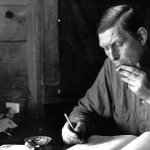Inamoratas, with an approbation,
Bestowed his title. Blessed his inclination.
He wakes, unwinds, elaborately: a cat
Tawny, reluctant, royal. He is fat
And fine this morning. Definite. Reimbursed.
He waits a moment, he designs his reign,
That no performance may be plain or vain.
Then rises in a clear delirium.
He sheds, with his pajamas, shabby days.
And his desertedness, his intricate fear, the
Postponed resentments and the prim precautions.
Now, at his bath, would you deny him lavender
Or take away the power of his pine?
What smelly substitute, heady as wine,
Would you provide? life must be aromatic.
There must be scent, somehow there must be some.
Would you have flowers in his life? suggest
Asters? a Really Good geranium?
A white carnation? would you prescribe a Show
With the cold lilies, formal chrysanthemum
Magnificence, poinsettias, and emphatic
red of prize roses? might his happiest
Alternative (you muse) be, after all,
A bit of gentle garden in the best
Of taste and straight tradition? Maybe so.
But you forget, or did you ever know,
His heritage of cabbage and pigtails,
Old intimacy with alleys, garbage pails,
Down in the deep (but always beautiful) South
Where roses blush their blithest (it is said)
And sweet magnolias put Chanel to shame.
No! He has not a flower to his name.
Except a feather one, for his lapel.
Apart from that, if he should think of flowers
It is in terms of dandelions or death.
Ah, there is little hope. You might as well—
Unless you care to set the world a-boil
And do a lot of equalizing things,
Remove a little ermine, say, from kings,
Shake hands with paupers and appoint them men,
For instance—certainly you might as well
Leave him his lotion, lavender and oil.
Let us proceed. Let us inspect, together
With his meticulous and serious love,
The innards of this closet. Which is a vault
Whose glory is not diamonds, not pearls,
Not silver plate with just enough dull shine.
But wonder-suits in yellow and in wine,
Sarcastic green and zebra-striped cobalt.
With shoulder padding that is wide
And cocky and determined as his pride;
Ballooning pants that taper off to ends
Scheduled to choke precisely.
Here are hats
Like bright umbrellas; and hysterical ties
Like narrow banners for some gathering war.
People are so in need, in need of help.
People want so much that they do not know.
Below the tinkling trade of little coins
The gold impulse not possible to show
Or spend. Promise piled over and betrayed.
These kneaded limbs receive the kiss of silk.
Then they receive the brave and beautiful
Embrace of some of that equivocal wool.
He looks into his mirror, loves himself—
The neat curve here; the angularity
That is appropriate at just its place;
The technique of a variegated grace.
Here is all his sculpture and his art
And all his architectural design.
Perhaps you would prefer to this a fine
Value of marble, complicated stone.
Would have him think with horror of baroque,
Rococo. You forget and you forget.
He dances down the hotel steps that keep
Remnants of last night’s high life and distress.
As spat-out purchased kisses and spilled beer.
He swallows sunshine with a secret yelp.
Passes to coffee and a roll or two.
Has breakfasted.
Out. Sounds about him smear,
Become a unit. He hears and does not hear
The alarm clock meddling in somebody’s sleep;
Children’s governed Sunday happiness;
The dry tone of a plane; a woman’s oath;
Consumption’s spiritless expectoration;
An indignant robin’s resolute donation
Pinching a track through apathy and din;
Restaurant vendors weeping; and the L
That comes on like a slightly horrible thought.
Pictures, too, as usual, are blurred.
He sees and does not see the broken windows
Hiding their shame with newsprint; little girl
With ribbons decking wornness, little boy
Wearing the trousers with the decentest patch,
To honor Sunday; women on their way
From “service,” temperate holiness arranged
Ably on asking faces; men estranged
From music and from wonder and from joy
But far familiar with the guiding awe
Of foodlessness.
He loiters.
Restaurant vendors
Weep, or out of them rolls a restless glee.
The Lonesome Blues, the Long-lost Blues, I Want A
Big Fat Mama. Down these sore avenues
Comes no Saint-Saëns, no piquant elusive Grieg,
And not Tschaikovsky’s wayward eloquence
And not the shapely tender drift of Brahms.
But could he love them? Since a man must bring
To music what his mother spanked him for
When he was two: bits of forgotten hate,
Devotion: whether or not his mattress hurts:
For breakfast—and for dinner twenty years
Ago last autumn: all his skipped desserts.
The pasts of his ancestors lean against
Him. Crowd him. Fog out his identity.
Hundreds of hungers mingle with his own,
Hundreds of voices advise so dexterously
He quite considers his reactions his,
Judges he walks most powerfully alone,
That everything is—simply what it is.
But movie-time approaches, time to boo
The hero’s kiss, and boo the heroine
Whose ivory and yellow it is sin
For his eye to eat of. The Mickey Mouse,
However, is for everyone in the house.
Squires his lady to dinner at Joe’s Eats.
His lady alters as to leg and eye,
Thickness and height, such minor points as these,
From Sunday to Sunday. But no matter what
Her name or body positively she’s
In Queen Lace stockings with ambitious heels
That strain to kiss the calves, and vivid shoes
Frontless and backless, Chinese fingernails,
Earrings, three layers of lipstick, intense hat
Dripping with the most voluble of veils.
Her affable extremes are like sweet bombs
About him, whom no middle grace or good
Could gratify. He had no education
In quiet arts of compromise. He would
Not understand your counsels on control, nor
Thank you for your late trouble.
At Joe’s Eats
You get your fish or chicken on meat platters.
With coleslaw, macaroni, candied sweets,
Coffee and apple pie. You go out full.
(The end is—isn’t it?—all that really matters.)
And even and intrepid come
Her body is like new brown bread
Under the Woolworth mignonette.
Her body is a honey bowl
Whose waiting honey is deep and hot,
Her body is like summer earth,
Receptive, soft, and absolute ...



















Comment form: